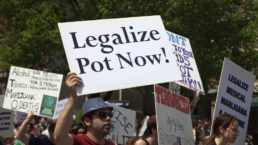Opponents thought legalization would lead to more teens using marijuana. Ten years since the first states legalized, the reverse has happened.
By Paul Armentano, OtherWords
“What about the children?”
This was arguably the most frequently posed question by critics in the years prior to state-level marijuana legalization. Many legalization opponents presumed that legalizing cannabis for adults would lead to an increase in marijuana use among teens.

But ten years following the first states’ decisions to legalize, data conclusively shows that these fears were unfounded.
For example, recent data from the Centers for Disease Control and Prevention determined that the percentage of high schoolers who report having used cannabis over the past 30 days actually fell from 23 percent in 2011 to 16 percent in 2021.
Likewise, the percentage of teens who acknowledge having ever tried cannabis has similarly declined. These downward trends coincide with the period when over 20 U.S. states legalized cannabis use by adults.
Those states have experienced similar declines in underage use. According to the findings of a 2020 study published in in the Journal of Adolescent Health, the adoption of state-level legalization laws “predicted a small significant decline in the level of marijuana use among [youth] users.”
Another study published in JAMA Pediatrics similarly concluded: “Marijuana use among youth may actually decline after legalization for recreational purposes,” since “it is more difficult for teenagers to obtain marijuana as drug dealers are replaced by licensed dispensaries that require proof of age.”
In fact, data from California, Colorado, and other legal states confirms that licensed cannabis retailers seldom if ever sell marijuana products to customers who lack proper ID.
Data published last year in the Journal of Safety Research reported that in California, where the adult-use market has been legally regulated since 2016, “there was 100% compliance with the ID policy to keep underage patrons from purchasing marijuana directly from licensed outlets.”
In short, states’ real-world experience with marijuana legalization affirms that these policies can be implemented in a way that provides regulated access for adults while simultaneously limiting youth access and misuse.
That’s one among many of the reasons why public support for adult-use cannabis legalization has risen dramatically over the past decade and remains at record highs.
To date, not a single state that has implemented legalization has reversed course. That’s because these policies are working largely as politicians and voters intended — and because they are preferable to marijuana prohibition.
Ultimately, common sense regulation allowing for the legal, licensed commercial production and sale of cannabis best addresses adult consumers’ demand while keeping marijuana products largely out of the hands of young people.
By contrast, the continued criminalization of cannabis only compounds the public safety risks posed to young people and others by the unregulated marketplace.
Paul Armentano is the Deputy Director of NORML (the National Organization for the Reform of Marijuana Laws) and co-author of the book Marijuana Is Safer: So Why Are We Driving People to Drink? This op-ed was distributed by OtherWords.org.
Recent Posts
How to Organize Safely in the Age of Surveillance
February 22, 2026
Take Action Now From threat modeling to encrypted collaboration apps, we’ve collected experts’ tips and tools for safely and effectively building a…
‘The Siege Must Be Broken’: Countries Called to Ship Fuel to Cuba After Trump Tariffs Struck Down
February 21, 2026
Take Action Now The US Supreme Court’s ruling “implies that Trump’s recent order imposing tariffs on countries selling oil to Cuba exceeds the…
Elite Depravity in Imperial Decline, A Zero Hour Conversation With Richard Wolff
February 20, 2026
Take Action Now “The system self-selects for psychopathy… the most sociopathically obsessive competitor and accumulator of personal power and…
Economics of Health For All: The Plan to Put Health at the Heart of the Global Economy
February 20, 2026
Take Action Now At the World Health Assembly in May, member states may endorse an unprecedented strategy declaring that health is not a cost – but…




